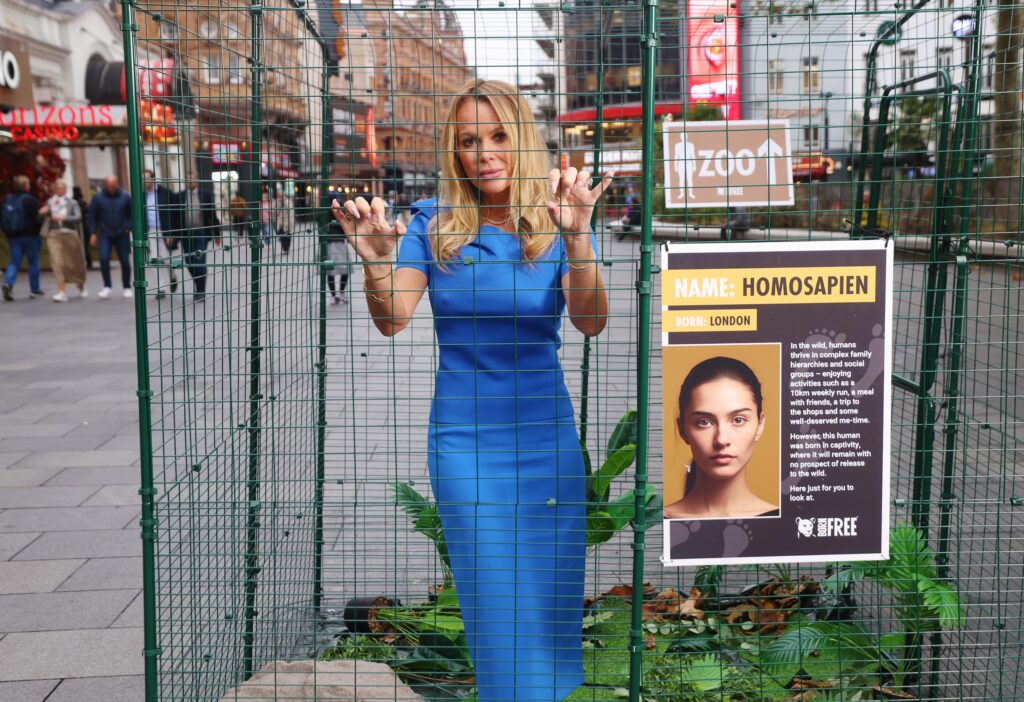The Human Animal Protest Shines Light on the Harsh Realities for Captive Big Cats

Presenter Kirsty Gallagher and actress Jenny Seagrove surprised tourists and commuters as they were locked in an uncomfortably small cage in London’s Leicester Square.
The cage stood as part of a protest to highlight the horrific lack of space big cats have in zoos across the UK and Europe, and the urgent need for public and government action.
The protest was created by charity Born Free who, today, have released a ground-breaking report revealing that the more than 3,000 big cats held in zoos across Europe and the UK face a myriad issues.
Big cats such as lions, tigers, cheetahs, pumas, jaguars, leopards and snow leopards suffer severely inadequate living spaces, unnatural social groupings, and distressing proximity to prey animals.
The protest was designed to highlight the unacceptable living conditions endured by big cats in zoos across the UK and Europe. Television presenter and model Kirsty Gallacher was confined in an enclosure symbolic of the captive world they are forced to inhabit.
The enclosure was complete with ‘zoo’ signage giving basic information about the human species and ‘Did You Know?’ facts outlining the limited space which is the reality for many large felines, and the devastating consequences this has on their wellbeing.
Born Free’s Clawing at the Cages report reveals that even the largest tiger enclosure is still 700 times smaller than their minimum natural range, and the average leopard enclosure is smaller than two netball courts.
A jaguar, which would roam an average of 6.75km every day in the wild, would need to walk the perimeter of their average enclosure 84 times every day to achieve the same daily travel distance.
According to Born Free, this confinement leads to ‘stereotypic behaviours’ like obsessive pacing, a likely indicator of chronic and high levels of persistent stress with an undeniable toll on their wellbeing.
The report also highlights the commercial exploitation of big cats in zoos which use them in visitor experiences and breeding programmes that offer little or no conservation value.
The zoo industry itself has estimated that a staggering 3,000 – 5,000 healthy animals, including big cats, are culled in zoos across Europe every year. Over a quarter of cheetah cubs born in captive facilities in 2019 reportedly died in infancy.
There have also been numerous incidents of big cats injuring and even killing each other when forced direct contact interactions for breeding programmes have been attempted by zoos.
As a consequence of their lifetime in captivity, the vast majority of these cats cannot ever be released into the wild, with less than 1% released between 1996-2019.
Born Free is asking Brits to join their Roar Free UK campaign, and is calling on the UK government to implement key recommendations, including stopping breeding programmes, ending the import of big cats from other countries, banning visitor interactions, the introduction of mandatory enclosure size regulations, and separating big cats from prey species.
Dame Virginia McKenna, Co-Founder & Trustee of Born Free, said: “It is distressing to see the conditions of big cats living in captivity, where these creatures are restricted to spaces many orders of magnitude smaller than those in which they have evolved to roam. In our new report, we are challenging the global zoo industry to phase-out big cat captivity and cease breeding animals destined for a life in an enclosure We hope the public will join us.”
Kirsty Gallacher, Born Free Patron, said, “I am honoured, as a Patron of Born Free, to be part of this campaign to draw attention to the awful exploitation of big cats in our zoos. As a passionate advocate for animal welfare, the thought of these poor animals living a life so far removed from what they should be experiencing in the wild, their natural life, is very distressing. We must phase this out, starting now.”
Chris Lewis, Captivity Research & Policy Manager, said: “‘Clawing at the Cages: The Problem with Keeping Big Cats in Zoos’ highlights how a zoo environment is no place for such apex predators. Big cats have undergone thousands of years of evolutionary adaptation to thrive in their ecological role. Yet, in zoos they live a life completely alien from that in the wild. The vast majority of these animals will never see the wild and keeping them in captivity will deliver little or no meaningful conservation contribution to their wild cousins.”
You can download the new Born Free report ‘Clawing at the Cages’ from their website here.
For more information and to support Born Free’s petition to the UK Government to end the breeding of big cats in zoos, visit www.bornfree.org.uk/clawing




